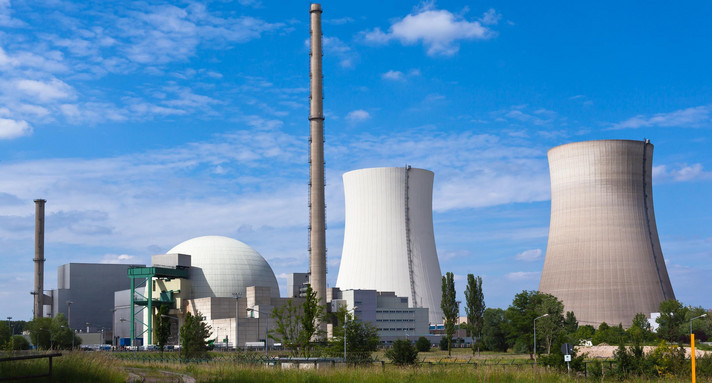Five nuclear power plants are located at three sites in Baden-Württemberg: Neckarwestheim (GKN I, GKN II), Philippsburg (KKP 1, KKP 2) and Obrigheim (KWO). They are are permanently shut down and under decommissioning.
Phasing out nuclear power
After negotiations with the energy supply companies, the federal legislator decided in 2002 to restrict the lifetimes of the German nuclear power plants. Each of the nuclear power plants was allocated a residual electricity volume, resulting in the power operation being discontinued after this volume had been generated. The residual electricity volumes were increased at the end of 2010, so that the lifetimes of the nuclear power stations were prolonged.
After the Fukushima accident in March 2011, the German Federal Government resolved to have the oldest running nuclear power stations temporarily shutdown so that safety checks could be carried out (a so-called moratorium).
Afterwards, an amended version of the Atomic Energy Act came into force in August 2011 comprising a gradual withdrawal from the nuclear energy programme by 2022 at the latest. The decisive reason was a re-evaluation of the risks after Fukushima.
The fundamental change to the legislation was that the Federal Government withdrew the increased residual electricity volumes that it had resolved in 2010. In addition, it stipulated shutdown dates for the nuclear power plants. The nuclear power stations that were temporarily shutdown in March 2011 were permanently taken out of operation and all of the other nuclear power plants had to follow by 2022.
The withdrawal from the nuclear energy programme that was resolved in 2002 has resulted in the Obrigheim nuclear power station being finally shut down in May 2005 and dismantling work has been in progress since 2008. The Neckarwestheim I (GKN I) and Philippsburg 1 (KKP 1) nuclear power plants were shut down in March 2011 as a result of the moratorium and they finally lost their power operation licenses on 6 August 2011. The Ministry for the Environment, Climate and Energy Sector has issued the decommissioning licenses for both of these nuclear power plants in February (GKN I) and April 2017, respectively (KKP 1).
The Philippsburg 2 (KKP 2) power plant was operated until the end of 2019 and received its decommissioning license in the same year. The latest possible shut down of the last nuclear power plant in Baden-Württemberg, Neckarwestheim II (GKN II), was end of 2022. In the light of the Russian war in the Ukraine and the imminent energy crisis, the amendment of the Atomic Energy Act of December 2022 entailed the temporary continuation of its operation until 15th April 2023. After the final shut down of the GKN II, the licensee made use of the decommissioning license which the Ministry issued in April 2023.

